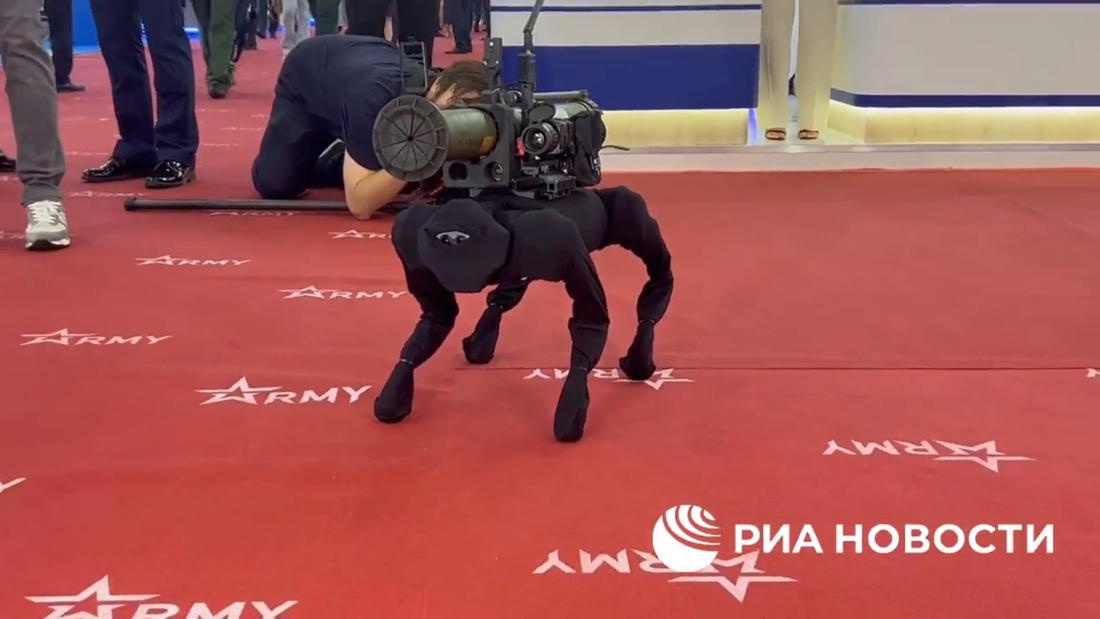Russian army debuts robot dog with grenade launcher strapped to back
08/18/2022 / By JD Heyes

As the Russian army continues to be bogged down fighting an allegedly inferior force in Ukraine, its scientists are nevertheless continuing to develop innovative ways to kill.
According to a video posted on social media, the Russian military debuted a robot dog at a recent arms show that came complete with a grenade launcher strapped to its back.
A video uploaded by RIA Novosti, a Russian-state owned news agency, shows the robot in action, in which the robot tiptoes around before laying down on the ground, its RPG pointed forward. The robot itself is dressed in something akin to the black outfit of a ninja, its eyes, which are presumably cameras, peeking out.
Video of the M-81 robot-dog armed with an RPG-26 at the Army 2022 defense expo. https://t.co/rUnwoCMoyS pic.twitter.com/BEDjnwstN0
— Rob Lee (@RALee85) August 15, 2022
The news agency reported that it spoke to the robot dog’s developers and noted in a post to Telegram saying, “this is a sample of the M-81 robotic system, capable of conducting aimed shooting and transporting weapons, and for civilian purposes it can be used in the emergency zone for reconnaissance, passage through rubble and delivery of medicines.”
“When used in combat, the robotic dog can also be engaged in target designation, patrolling and security,” the post noted further.
The video comes from the “Army 2022” event, an ongoing arms fair in Moscow, Vice reported. The event is being held all week and will end on Sunday. There are more than 1,500 participants, at least 28,000 exhibits, and features several innovative concepts including an unmanned military truck that does not have a cab.
Last month, Motherboard reported on a video that showed a similar robotic dog that was outfitted with a fully automatic weapon attached to its back. The ‘robodog’ was seen moving back and forth on a range firing the weapon, though the platform was not very stable.
As reported by CyberNews, Boston Dynamics has shown how its leading robotic model can pull off some amazing dance moves as well as other human-like movements. But other firms are working to turn robots into killing machines, which is foreboding, to say the least.
Some of the latest models, video of which has been posted to social media, are now resembling something out of a sci-fi movie. Take a look:
Twitter user Sean Chiplock shared a video of a robot “dog” in Russia firing a mounted machine gun, though the platform is not very stable. Sean Gallagher, a senior threat researcher at Sophos, opined that the robot dog is of Chinese origin.
“All the people who laughed off the ‘worrywarts’ years ago for freaking out about the Funny Dancing Robot Dogs ™ should be forced to watch this video once a day for the remainder of the year,” he wrote in a Twitter post.
“I especially love all those stray bullets being shot off at completely random angles to later strike some random citizen, because the billion-dollar-robot somehow still can’t account for muzzle rebound after the shots,” Gallagher added in another tweet. “Our tax dollars being put to work, with or without consent.”
In April, Natural News reported that the French army had acquired a Boston Dynamics robodog and had begun testing it in a number of combat environments.
“France’s main military academy, the Saint-Cyr, located in the northwestern region of Brittany, shared several images of soldiers with Spot during military exercises,” the report said, noting the name the French had given the robotic dog.
Michael Perry, vice president of Business Development at Boston Dynamics, said at the time that his company is learning more about the robodog’s potential military application at the same time as the French army was learning.
“We’re not clear on the exact scope of this engagement,” said Perry.
Sources include:
Submit a correction >>
Tagged Under:
arms show, automatic weapon, big government, dystopian, future tech, grenade launcher, innovations, inventions, military application, military tech, Moscow, national security, robodog, robotics, robots, Russia, Russian army, War, weapons technology
This article may contain statements that reflect the opinion of the author
RECENT NEWS & ARTICLES
COPYRIGHT © 2017 COMPUTING NEWS



















